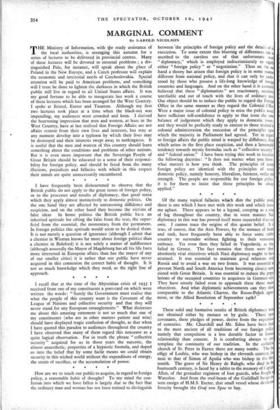How are we to teach our public to acquire, in
regard to foreign policy, a reasonable habit of thought? To my mind the con- fusion into which we have fallen is largely due to the fact That the ordinary man and woman has not been trained to distinguish between 'the principles of foreign policy and the details of it execution. To sonic extent this blurring of differences can bt ascribed to the careless use of that unfortunate wor "diplomacy," which is employed indiscriminately to signify either "foreign policy" or "negotiation." Thus on the Ott hand a theory has arisen that foreign policy is in some manner different from national policy, and that it can only be uncle/. stood by those who possess a life-long knowledge of foreiga countries and languages. And on the other hand it is current' believed that these " diplomatists " are reactionary, secretive, unreliable and out of touch with the lives of ordinary met Our object should be to induce the public to regard the Foreign Office in the same manner as they regard the Colonial Cffi Were a major issue of colonial policy to arise the public would have sufficient Self-confidence to apply to that issue the sum balance of judgement which they apply to domestic issues; and they would be perfectly ready to entrust to those trained le colonial administration the execution of the principles upen which the majority in Parliament had agreed. Yet in regard to foreign affair's the public mind is warped by diffidence, from which arises in the first place suspicion, and then a lamentable tendency towards mystic formulas such as "collective security' and "federal union." I have been trying this week to inculcate the following doctrine: "It does not matter what you know. what matters is how you think. The principles -of sound foreign policy are identical with the principles of sound domestic policy, namely honesty, liberalism, fairness, order and strength. The people are responsible for our foreign policy. it is for them to insist that these principles be always applied."


























 Previous page
Previous page